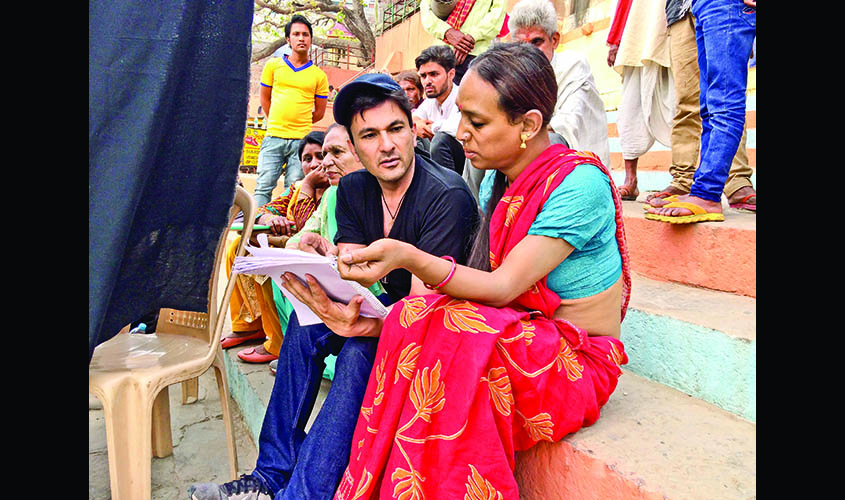Rudrani Chettri is a transgender activist, who founded India’s first transgender modelling agency, Bold, in 2015. The first organisation of its kind, Bold is headquartered in New Delhi and it is aimed at empowering India’s transgender community.
Chettri realised that transgenders, especially transwomen, face social discrimination and taunts every day, and are being increasingly marginalised by our culture. “People do not believe in the idea that transgenders are also beautiful. That they can also be models and actors. So, I thought let’s do it… If not today, then when?” said Chettri, who has been subjected to much abuse for being a transgender.
When Western countries can have successful transgender modelling agencies, then why not India? That’s the question Chettri began with. She is concerned about how social conditioning has led to the marginalisation of transgenders in our society. And she believes that cultural empowerment is one way to counter that.
There has been a tectonic shift in the way people look at transgenders in this country after the 377 verdict. Chettri hopes that with the help of Bold, she would be able to make a difference in this social context and also generate alternative sources of livelihood for transgenders.

When asked about how transgenders are ill-treated in India, Chettri recalled an incident from 2014 that appalled her. She said, “It was towards the end of September in 2014. I was going inside a mall because I wanted to book a club for my birthday in October, but I was not allowed to go inside. I was stopped by the watchman and he said ‘Aap jaise logon ke liye yahan kuch bhi nahi hai’ [There is nothing here for people like you]. It was hurtful and I realised that even if you go to a layperson and ask what they think of transgenders, all they imagine is someone who is ugly or who begs near traffic signals. They cannot imagine transgenders as anyone or anything else.”
Chettri is one of the founders of the Mitr Trust, which was set up in 2005 with the objective of resolving issues faced by the transgender community, and working in areas ranging from healthcare to basic human rights. While all its co-founders got better opportunities and decided to leave, Chettri decided to continue her association with Mitr.

Against all odds, Chettri has been working hard towards building a platform for transgender models to enter the fashion industry and has received appreciation for her work. She said, “My agency focuses more on the entertainment and art world, because people think the third gender doesn’t fit into the realm of fashion and films. Whatever work transgenders get in these areas is tokenish, or inspired by social work. For example, if you and I get the same modelling assignment, they will pay you money but not me.”
Financial hiccups have bothered the modelling agency as most transgenders are not paid for modelling assignments, but are instead given replies like, “We are giving you the opportunity of being on the cover, which is a huge thing in itself.”
However, Chettri says that it is fine if they are not paid for now. She thinks that a centuries-old mindset can’t be changed in a day.
Gathering funds for starting the modelling agency was a big challenge for Chettri. She told us that they collected the sum through BitGiving, a crowd-funding platform.
Employment for transpersons has also been a major concern for her organisation. According to Chettri, it is our society that pushes transgenders into begging, sex work and other kinds of desperate measures. And so, it becomes a social responsibility to help rehabilitate this community.
“Transgenders could be anything—they could be doctors, engineers, teachers or anything else. And why not? When there were transpersons in the puranas and the kathas, then why not now?” she said.
When asked about her family’s stand on the movement she has started for the welfare of transpeople, she said, “My parents have been very supportive. They have always told me to be as I am and guided me not to go on the wrong path, because, you know, how transphobic and homophobic the whole environment is.”
Chettri graduated in English literature and has always been interested in reading. She is also a travel buff and loves to visit Rishikesh. In fact, it was during one of her travels that she realised she could venture into modelling. “I used to click pictures and upload them on social media and all my friends used to compliment me and even tried to pose like me. They told me they wanted to be like me, like a model. So this stuck in my mind and I went forward with it.”
Chettri’s appeal to the general public is that they treat the transgender community with respect, at least on the grounds of humanity. “It’s quite saddening because in a country like India, with such diversity, it’s unfair to push us back just by saying, ‘You don’t deserve to be here.’ We transgenders or let’s say hijras have always been a part of this country’s culture and moreover, we are also human. Human like everybody else.”
Chettri has already been featured in a big movie named The Last Colour, which is Chef Vikas Khanna’s directorial debut, and two short films, and she now wants to take up more projects that involve acting and modelling. She is optimistic that Bold would also be soon accepted by the fashion industry, which would bring about a much-needed change in our culture.

